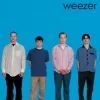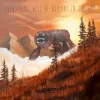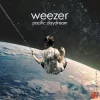History Weezer
Weezer is an American rock band. Formed in 1992, they have released eight full length albums, six EPs, and a DVD. Their latest album, titled 'Weezer (White Album)', came out on April 1st, 2016. They've sold over nine million records in the United States to date. Playing music influenced by alternative bands and power pop artists among others, they're sometimes viewed as a part of the 90s indie movement.
Weezer started in Los Angeles, California when Rivers Cuomo joined with Patrick Wilson, Matt Sharp, and Jason Cropper, who was later replaced by Brian Bell. Five weeks after forming, they had their first gig, opening for Dogstar at Raji's Bar and Ribshack on Hollywood Boulevard. Weezer began playing clubs to small audiences around L.A. and recording homemade demos. The group soon received attention from various A&R reps, and the guys were signed on June 26, 1993 by Todd Sullivan, an A&R rep from Geffen Records. The band became a part of the DGC label (which later turned into Interscope).
Creating "The Blue Album" (1993-1994)
The self-titled debut, 'Weezer', commonly referred to as 'The Blue Album', came out on May 10, 1994. It picked up considerable acclaim. Tracks "Undone (The Sweater Song)" (also known as "Undone - The Sweater Song"), "Buddy Holly", and "Say It Ain't So” were released as singles. The album was produced by former The Cars frontman Ric Ocasek. During the recording of the Blue Album, Jason Cropper left the band to take care of his future wife, who was pregnant with their first child. Jason was replaced by Brian Bell, a then bassist from a band called Carnival Art.
The first single, "Undone - The Sweater Song", garnered attention given that Spike Jonze directed the music video for the track. In a single, unbroken take, that video featured Weezer performing the song on a sound stage with various amusing studio antics, including a pack of dogs swarming the set. Jonze also later directed the band's second video, which was made for the single "Buddy Holly".
Named after the famous 50s rock star, the "Buddy Holly" music video featured footage of the television sitcom Happy Days spliced with the band performing in a remade "Arnold's Diner", a setting from the series. The video had heavy rotation on MTV. It went on to win Jonze and the band four MTV Video Music Awards (including Breakthrough Video and Best Alternative Music Video) and two Billboard Music Video Awards. This video was also included as a bonus on the Microsoft Windows 95 CD. The success of the video arguably served as the key for pushing the band into the mainstream rock spotlight.
The video for Weezer's third single, "Say It Ain't So", was directed by Sophie Muller. It featured the bandmates playing hacky-sack and performing in the band's original rehearsal space in California. A photo of what the band calls the "Garage" is featured on the inside cover of the album.
'The Blue Album' is currently certified three times platinum, making it Weezer's all-time best seller and one of the most popular rock albums of the early 90s. It was re-released and repackaged in 2004 as a "Deluxe Edition". That version of the album included a second disc of B-sides along with other previously unreleased rarities.
Killer Record: Pinkerton(1995-1997)
In late December 1994, Weezer took a break from touring for the Christmas holidays. Cuomo traveled back east to his home state of Connecticut. Using an eight-track recorder, he began piecing together demo material for Weezer's next album. Cuomo's original concept for Weezer's sophomore effort was to be a space-themed rock opera, with him mulling over the title 'Songs from the Black Hole'.
The album was intended to feature songs that flowed together seamlessly, and it was planned to end with a special coda that briefly revisited the major musical elements of the piece (something reminiscent of progressive rock works from the 70s). The band began demoing and working on Cuomo's concept through intermittent recording sessions in the spring and summer of 1995. Ultimately, the 'Songs from the Black Hole' album concept was dropped. The album that actually came out would instead feature some old tunes made from before their first album (which had briefly been incorporated into the space-opera) as well as some new ones written while Cuomo was at Harvard.
After the multi-platinum success of their debut album, Weezer's sophomore album was finally released on September 24, 1996. Titled 'Pinkerton', the work peaked at #19 in the U.S. upon its release. It didn't sell as many copies as its predecessor, probably due to its darker, more abrasive nature. Pinkerton was labeled "one of the worst albums of 1996" by a Rolling Stone reader poll. Eventually, the album grew into a cult classic, and is viewed by some fans as Weezer's greatest album. In fact, in 2004, the magazine changed their rating to a 5-star rating and inducted it into The Rolling Stone Hall Of Fame. This article can be found in the Reviews sections of the 500 Greatest Songs Of All Time issue.
Three singles were taken from the album: "El Scorcho", "The Good Life" and "Pink Triangle". The video for "El Scorcho" featured the band inside a darkened room, sitting in a circle, that would be lit differently throughout parts of the song; it was directed by Mark Romanek. The video for "The Good Life" was directed by the team of Jonathan Dayton and Valerie Faris (though no known video was made for "Pink Triangle"). However, the singles did not receive as much airtime as the singles from their debut album.
The title of the album comes from the character Lieutenant Pinkerton in Giacomo Puccini's opera Madame Butterfly. The entire album is heavily influenced by the opera's story line. Madame Butterfly is mentioned under her real name, Cio-Cio San, in "El Scorcho." The song "Butterfly" is written from Pinkerton's point of view at the end of the opera.
The album's title was the source of a legal challenge. Pinkerton Securities of Encino, Calif., filed a temporary restraining order against the band and its Geffen record label for copyright infringement two days before the album was to be released on September 24, 1996. A judge ruled against the security company and the album was finally released.
Weezer completed their touring for Pinkerton in the summer of 1997. The members of the band took a break, with drummer Patrick Wilson returning to his home in Portland, Oregon to work on his side project, The Special Goodness, Matt Sharp left to complete the follow-up album for his group The Rentals, and Brian Bell went to work on his group, Space Twins.
Rivers Cuomo returned to Boston, Massachusetts, but dropped out of Harvard to focus on songwriting. He eventually went into seclusion. He painted his walls black, disconnected his phone, and didn't communicate with anyone. Later, he formed a solo group, The Rivers Cuomo Band. Cuomo used the group to try out unreleased material, including possible new songs for the next Weezer album. The band played their first show at T.T. the Bear's on October 8, 1997. Future Weezer bassist Mikey Welsh was part of the solo band's lineup. The Boston songs were later abandoned and not used on the next Weezer album, but live recordings of the Boston shows are openly traded on the internet. In February of 1998, Rivers left Boston and Harvard academia behind and returned to Los Angeles.
Pat Wilson and Brian Bell joined Cuomo in L.A. to start work on the next album. Matt Sharp did not rejoin the band and officially left the group in April of 1998. The group decided on Mikey Welsh as Sharp's replacement. Weezer continued rehearsal and cut demos until the fall of 1998. Frustration and creative disagreements led to a decline in rehearsals, and in late fall of 1998, drummer Pat Wilson left for his home in Portland pending renewed productivity from Cuomo.
The band would not reunite until April of 2000, when the Fuji Festival in Japan offered Weezer a high-paying gig to play in August 2000. The festival served as a catalyst for Weezer's productivity, and from April to May, 2000, the band rehearsed and demoed new songs in Los Angeles. The band returned to live shows in June 2000, but without the Weezer name. Instead the shows featured the group's first use of the pseudonym Goat Punishment.
On June 23, 2000, the band, now back under the Weezer name, joined the Warped Tour for eight planned dates. Weezer was received well at the festival, leading the band to book more tour dates for the summer.
SS2K - The Summer Sessions (2000)
In the summer of 2000, Weezer (now consisting of Rivers Cuomo, Mikey Welsh, Pat Wilson, and Brian Bell) went on tour. Weezer's setlist consisted of 14 new songs that fans have labeled the Summer Songs of 2000 (commonly abbreviated, SS2K). When 13 of these songs did not appear on Weezer's next album, fans of the songs started a petition demanding the release of studio demos. Eventually, mp3s were made available on the band's official website for download. Three SS2K songs, "Hash Pipe", "Dope Nose" and "Slob," have appeared on studio albums ("Hash Pipe" on the Green Album and "Dope Nose" and "Slob" appearing on Maladroit).
Green Album & Maladroit (2001-2003)
Eventually, the band went back into the studio to produce a third album. Weezer (2001) chose to repeat the self-titled name of their first release. This album quickly became known as The Green Album due to its distinctive bright green coloring. Shortly after the release of The Green Album, Weezer went on another American tour. They attracted a new generation of fans thanks to heavy MTV rotation for the videos of their hit singles "Hash Pipe" and "Island in the Sun."
The video for "Hash Pipe," directed by Marcos Siega featured sumo wrestlers and was nominated for Best Rock Video at the 2001 MTV Video Music Awards, but lost out to Limp Bizkit's "Rollin." Two videos were recorded for "Island in the Sun." Marcos Siega directed the first, which focused on a Mexican wedding, and Spike Jonze directed the second, which involved Weezer with animals in a wildlife reserve. Their video for "Photograph" was shot and put together by Weezer friend and unofficial "5th member" Karl Koch.
As reported on August 16th, 2001, by MTV, bassist Mikey Welsh was checked into a psychiatric hospital. His whereabouts were previously unknown, as he mysteriously went missing before their second filming of the "Island in the Sun" music video, featuring the band with various animals. Weezer was prompted to find a temporary replacement for Welsh. Through a mutual friend, Cuomo received Scott Shriner's number and asked if he was interested to fill in for Welsh. Shriner, at first believing it was a prank phone call, accepted.
Much to the ire of their recording label, Weezer decided to forgo the industry-preferred waiting period of 2 to 3 years between albums and began recording demos for their fourth album. The band took an experimental approach for the recording process by allowing fans to download the demos from their official website in return for feedback. After the release of the album, the band subsequently stated that the process was somewhat of a failure, as the fans did not supply them with cohesive constructive advice. Only the song "Slob" was included on the album due to general fan advice.
The fourth album, Maladroit, was released in 2002 with Scott Shriner replacing Mikey Welsh on the bass. The album served as a harder-edged version of their trademark catchy pop-influenced music. Although met with generally positive critical reviews (including making many "Best of '02" lists), its sales were not as strong as The Green Album and remains their worst-selling album to date.
Two singles were released from the album. The "Dope Nose" music video featured a Japanese motorcycle gang, and was put into regular rotation. The music video for "Keep Fishin'" combined Weezer with The Muppets, and had heavy rotation on MTV. Both videos were directed by Marcos Siega.
As soon as Maladroit had wrapped up, the band immediately began work on their fifth album, recording numerous demos between tours for Maladroit (often recording as many as 24 songs in a day). These songs were eventually scrapped, and Weezer took a break after the release of two albums in quick succession.
Make Believe (2003-2005)
In March of 2004, Weezer released their first DVD. Titled Video Capture Device, the DVD contains all of their then-current music videos. It also included live concerts and homemade movies. The DVD was certified "gold" on November 8, 2004.
From December 2003 to the summer and early fall of 2004, the members of Weezer recorded a large amount of material intended for a new album to be released in the spring of 2005 with producer Rick Rubin. The band's early recording efforts became available to the public through the band's website. The demos, entitled the Album Five Demos (or album 4.5), were a big hit with fans but only one song, "Hold Me", would be included on the finished album. That album, entitled Make Believe, was released on May 10, 2005. The album was very well received by the public. However, long-time Weezer fans often consider it as a decline from their earlier albums, and has received mixed reviews.
The album's first single, "Beverly Hills," became a hit in the U.S. and worldwide, staying on the charts for several months after its release. The video for "Beverly Hills", directed by Marcos Siega, featured the band and a select choice of fans interacting with Playboy Bunnies and Hugh Hefner at the Playboy Mansion. It became the first Weezer song to hit #1 on the Billboard Modern Rock chart. The song was nominated for Best Rock Song at the 48th Annual Grammy Awards, the first ever Grammy nomination for the band. The video for the song was also nominated for Best Rock Video at the 2005 MTV Video Music Awards.
During the "Make Believe" tour of 2005, Cuomo allowed other members of the band to step into the spotlight of certain songs:
* Brian Bell: "Getchoo" and "Why Bother?" (from Pinkerton), "Smile" (from "The Green Album"), and "Keep Fishin'" (from Maladroit)
* Scott Shriner: "Fall Together", and "Dope Nose", and "In the Garage" (from "The Blue Album")
* Patrick Wilson: "Photograph" (from "The Green Album"), "Song 2" (Blur cover, whilst playing lead guitar)
In late August 2005, Weezer performed with the rock band The Pixies, which was one of Rivers' influences, at Summerfest and other dates.
From September 8 to October 28, 2005, Weezer set out on a tour with the Foo Fighters, which, to many, was simply called Foozer. The Foozer tour was awarded "Most Creative Tour Package" at The 17th Annual Concert Industry Awards.
On December 13th, 2005, Winter Weezerland EP was released on iTunes. The EP was essentially a re-release of the 2000 Weezer christmas CD which featured "The Christmas Song" and "Christmas Celebration".
Also, in late 2005 the band released the second single off Make Believe, called "We Are All on Drugs" (for family-oriented purposes, some releases of the song were renamed "We Are All in Love"), and the music video was directed by Justin Francis. It didn't do well as a single, and many weezer fans hated it.
In early 2006, it was announced that Make Believe was certified platinum, and "Beverly Hills" was the second most popular download on iTunes for 2005.
Also in early 2006, Make Believe's third single, "Perfect Situation", spent four weeks in a row at the #1 spot on the Billboard Modern Rock chart, a personal record for Weezer. The Perfect Situation video starred Elisha Cuthbert and was directed by Marc Webb. The only other Weezer track to hit #1 was "Beverly Hills," for one week. "This is Such a Pity" is the band's fourth single from the album, but no music video was made for its release.
The Future (2006-)
As of January, 2006, Bell and Wilson are set to portray Velvet Underground members Lou Reed and John Cale in Factory Girl, an upcoming film about the life of Andy Warhol cohort Edie Sedgwick.
Rivers Cuomo announced a new song called "Piece of the Pie" while onstage during the band's October 7th, 2005 show in Detroit (but did not perform it). Cuomo has mentioned other song ideas recently, dropping titles and ideas such as "East Coast or West Coast," "Pig" and new songs with lyrics he described as "bloggy".
Rivers has commented on his myspace blog that his recent comments to mtv.com were 'misquoted' and said that what he meant "was that the soccer song, "Our Time will Come", certainly won't be on a Weezer album." and said "The rest of the songs, though, are definite contenders for a Weezer record." A strong hint that the band are in fact only on a break and that a sixth album is on the card.
In late 2006, Brian Bell began work on a new project called The Relationship which fans can follow on the band's myspace page. Pat Wilson told Keifer Wells and Martin Michalek in a radio interview for Andover High School that he and Scott Shriner had been creating songs together and are trying to get Rivers to sing for when the band has jam sessions. Pat has also been creating a few Special Goodness songs, but said little more on the subject. Fans can currently follow the news of the band at Rivers Cuomo's myspace page and the official Weezer website.
Weezer's sixth studio album will be released on June 3, 2008, just over three years after their latest release, Make Believe. Rick Rubin produced the album[30] and Rich Costey provided the mixing[31] for what Weezer fans are calling "Album Six".[32] The record is being described as "experimental", and according to Cuomo, includes longer and non-traditional songs, TR-808 drum machines, synthesizers, Southern rap, baroque counterpoint, and band members other than Cuomo writing, singing, and switching instruments.[33]
Lead singer Rivers Cuomo released a demo-compilation album entitled Alone: The Home Recordings of Rivers Cuomo on December 18, 2007. The album contains demos of Cuomo's that span from 1992 to 2007, including songs from Weezer's abandoned second album, Songs from the Black Hole. Also included in Alone is a song intended for Weezer's upcoming 6th studio album, entitled "This is the Way". The booklet of Alone tells of the band wanting the song for the album, but ultimately choosing "an epic, 6-minute, symphonic type of art song" entitled "Daydreamer" instead.
Weezer's "Weezer" (also referred to as "The Red Album") was released in June 2008. Rick Rubin produced the album and Rich Costey mixed it. The record is being described as "experimental", and according to Cuomo, includes longer and non-traditional songs, TR-808 drum machines, synthesizers, Southern rap, baroque counterpoint, and band members other than Cuomo writing, singing, and switching instruments. Pat Wilson said that the album cost about a million dollars to make, contrasting it with the $150,000 budget of "The Blue Album". The album's singles were produced by Jacknife Lee. Its lead single, "Pork and Beans", topped the Billboard Modern Rock Tracks charts for 11 weeks, and its music video won a Grammy for Best Short Form Music Video. The album's second single, "Troublemaker", debuted at #39 on the Billboard Hot Modern Rock Tracks chart and peaked at #2. In October 2008, the group announced that the third single would be "The Greatest Man That Ever Lived (Variations on a Shaker Hymn)".
In 2009, the band announced their next album, "Raditude", would be released on November 3, 2009, where it debuted as the seventh best-selling album of the week on the Billboard 200 chart. The band scheduled tour dates in December 2009 extending into early 2010 to coincide with the new album's release. On December 6, 2009, Weezer frontman Rivers Cuomo was injured when his tour bus crashed in upstate New York due to black ice. Cuomo suffered three broken ribs, and his assistant broke two ribs. His wife, baby daughter, and their nanny were also on the bus; however, they escaped injury. Weezer cancelled tour dates the following day. The band resumed touring on January 20, 2010.
In December 2009, it was revealed that the band was no longer with Geffen Records. The band stated that they would still release new material, but they are unsure of the means, whether it be self-released, released online, or getting signed by another label. Eventually, the band was signed to the independent label Epitaph.
The album "Hurley" was released in September 2010 through Epitaph Records. The name comes from the character Hugo "Hurley" Reyes from the television show "Lost". Jorge Garcia, the actor who portrayed Hurley, stated that being featured on the album cover is "one of the biggest honors of [his] career." Weezer used internet streaming service YouTube as a way to promote the album. Weezer loaned itself to 15 amateur online video producers, "going along with whatever plans the creator could execute in about 30 minutes." They have used many of the popular channels to promote themselves, such as Barely Political, Ray William Johnson and Fred Figglehorn. The Gregory Brothers solicited musical and vocal contributions from the band on one of its compositions built around speeches by Rep. Charles Rangel and President Barack Obama. Weezer calls the promotion "The YouTube Invasion"
On November 2, 2010, Weezer released another studio album called "Death to False Metal". This album was composed of newly re-recorded versions of unused recordings spanning the band's career.
On October 9, 2011, the band announced on their website that former bassist Mikey Welsh had died.
The band currently consists of the following members:
* Brian Bell — guitar, backing vocals
* Rivers Cuomo — vocals, guitar
* Scott Shriner — bass guitar, backing vocals (2002-present) (plays on Maladroit and Make Believe)
* Patrick Wilson — drums
Former members:
* Jason Cropper — Guitar, left the band in September 1993 (believed to have been fired by Cuomo, although it is not clear as Cropper is forbidden from discussing the issue)
* Matt Sharp — bass guitar, backing vocals (1992-1997) (plays on The Blue Album and Pinkerton)
* Mikey Welsh — bass guitar, backing vocals (1998-2001) (plays on The Green Album)
Creative Commons By-SA License
 FM
FM















